For almost two decades, running was never a loaded thing for me. I was just happy to go the distance at a 9 to 10ish minute-mile pace, a speed I scientifically determined my clocking my run on my Timex, then driving the same route in my car, post-run, and grabbing the calculator when I walked in the door.
For a variety of reasons (a coach started me on speedwork, I bought a Garmin, I thought I needed a challenge) I’m no longer the runner who is pleasantly surprised when I rip off a sub-nine-minute mile. Now I expect sub-9 to be the norm, not the exception. I gotta admit, at the risk of sounding like a poser and not a runner, this whole what’s-my-split? thing is not working for me.
Check that: running faster is working for me. Who doesn’t like to see their name climb up the ladder of race results? But the mentality that comes with running faster–obsession with numbers, not fully appreciating the race’s scenery and my fellow runners, and, most importantly, marking a race a failure if I don’t meet my goals–is not working for me.
On the heels of the Austin half-marathon over Valentine’s Day where I had no race strategy and that really didn’t work for me, I lined up at a 10-mile local race, the third in a 3-race series, on Saturday morning. (FYI: Not one to constantly test myself, I wouldn’t have raced 13 days after just racing, but I signed up for the series, instead of individual races, to save $10. So my cheapness forced me to run it.)
For most of Friday, I kept thinking about how I wanted to run it:
Start with a 9:30 mile, and then every mile, go 10 seconds faster. I’d end with a 8:00-minute mile, which is super ambitious for me after running 9 miles. The upside? At least I’d finally negative split a race.
Plan B: Maintain splits between 8:20-8:40 for 10 miles. Evens out the ups and downs, both with regard to hills and my ridiculous, PMS-worthy mood swings that hit me in races.
No. No more math. Just run at an effort that feels good. Maybe a 6 on a scale of 1-10? O.k., a 7. This is a race, after all.
Find somebody after the first mile who looks about your speed and like she knows how to pace herself, and follow her. Do whatever you need to do to stay with her.
And on and on. My brain, which chugs with the same efficiency as a green-screened Apple computer from 1984, did not need this distraction on an already hectic Friday.
Still, around and around it went, until the race started and I still had no firm plan. So I stayed with option B for about 5 miles, until the course went uphill for 2 miles and–bonus for you today!–into a healthy headwind. My splits shot up to 9:40 or something. Once again, I became discouraged, even though my groaning hamstrings, straining from the incline, and the fact that my short hair was actually blowing in the wind, provided very tangible reasons for the deceleration.
I was able to get back below 8:40 for the last mile. As I sped in as quickly as I could, checking my Garmin more often than I check e-mail on days I feel lonely, I realized I’m sick of sucking the fun out of running. There’s a reason why I work with words, not numbers: I like vague concepts and the ability to interpret a situation in many ways. Numbers, concrete and with no room for error, tell a very flat story.
The more I fixate on my splits, the more frustrated and disappointed I get. Right now, trying to get faster feels like looking for love: the more you force it, the more elusive it becomes. Or, in other words, preoccupation with anything often has the opposite effect of what I want.
So for at least a week, I’m officially taking my eyes off the prize (or at least my Garmin) to see how that feels. I’m hoping that I’ll accidentally meet up with another kind of love–the love of running–out on the path.
As I embark on my mini-experiment, I’m wondering: do you get too numbers obsessed? If so, how do you tone it down? Or is there no such thing as being too split-headed in your view?
*I couldn’t resist posting this picture of Lydia, just two weeks old. She’s wearing American Girl skates, which belong to her sister, Isabel, who slyly slipped them on her when their mom wasn’t watching. If you’ll look closely, she’s slyly giving me the finger.


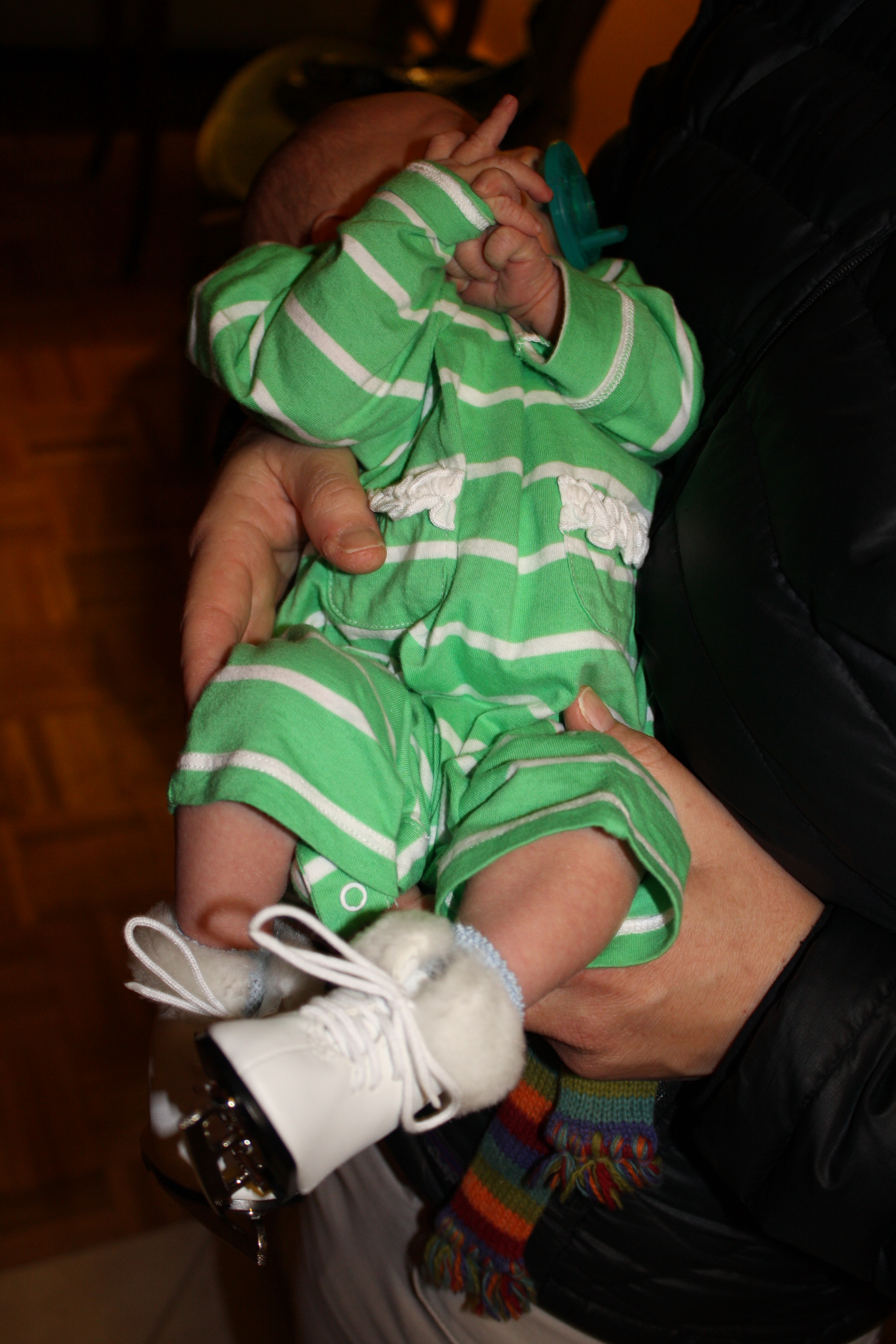
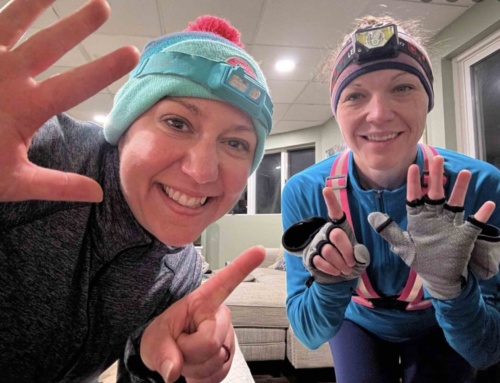
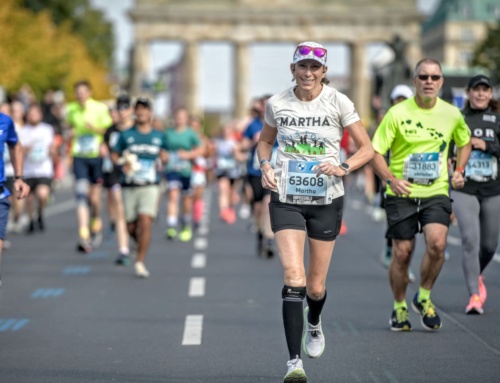
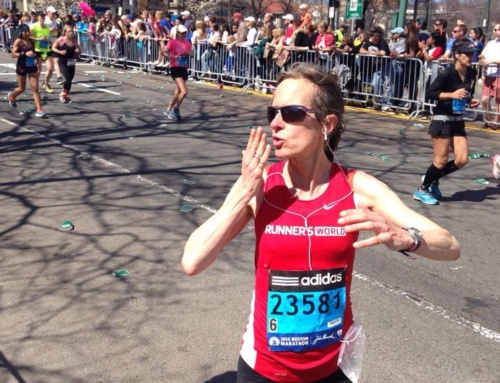
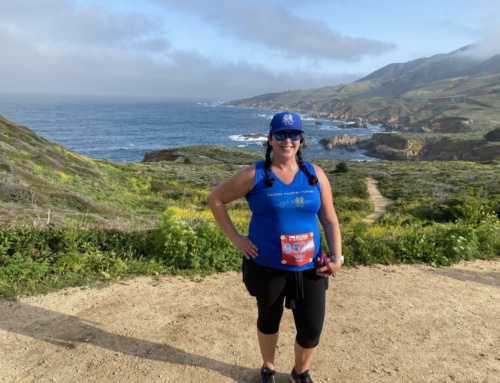
Yes! Completely obsessed with numbers too, though lately it’s how many miles a week I’m (not) running. I don’t know how it happened. I used to shoot for four days a week, now I’m running four, swimming a fifth and feeling like I need to cut out the swimming because my mileage is too low. Sigh. I’m not a math person either (I’m an editor, and math is our big joke around here whenever someone is trying to calculate page count). You pose a good point though. The more focused I get on speed or on mileage, the less I am loving the run. This is made more frustrating for me by the fact that my non-GPS Garmin has me much, much faster than my husband’s Garmin 450 (or 405?) does. Let me live in denial and believe that my Garmin is the correct one.
I have two girls (ages 3 and 6), so like you, my days are a whirlwind of gymnastics drop-offs and girl scout cookie selling (why am I the one selling the freaking cookies??) and trips to Target. So I guess the upshot is that I should be proud I’m working out two days a week let alone five!! I’m running Chicago this fall and am thinking I bit off more than I can chew.
P.S. Great job in your ten-miler. I’d kill to be able to go sub 9 period. I think you rock! Can’t wait for the book to come out!
Yes, why are youthe one selling the cookies, Natalie? :)
And rest easy: I’m sure your Garmin is correct. :) Keep training for Chicago and see where it gets you–I bet you’ll be pleasantly surprised. Thanks for reading.
Great post and super job on your racingt! And I can so relate – checking the garmin more than email…chtyea! I do my best running when I’m not training for anything. I have faster training days than race days most of the time. (Maybe I need to read the Kara Goucher article again). Anyway, kudos for skipping it for a while. My running partner is training for Eugene and I’m (99% sure) that I’m not going to run it, but I’m doing the training with her. Feels easy, no pressure, running distance for the joy of it. Plus it’s cheaper….hmmm, might be on to something. And yet, my personality needs challenge, a little drama even. Where would I be without yet another emotional roller coaster that racing brings? Not quite ready to give that up entirely. I love this bit of Bingham’s piece “Why I’m a Runner” … I AM A RUNNER because I am willing to lay it all on the line. I know that every finish line has the potential to lift my spirits to new highs or devastate me, yet I line up anyway.
I love that last thought, Laura…new highs or devastation. I think that, in essence, captures why most of us race (race being a relative term, at least for me). I also need a little drama…and am very grateful to have a place to voice it and people who will actually listen. Have fun w/the non-Eugene training; love that idea.
Thank you, Dimity, for putting my thoughts into your post!!! I so KNOW what you mean!!!!! I get peeved when I find myself immersed too deeply in the whole numbers game. I try to fit in at least one run during the week where I “run happy,” no Garmin and sometimes no music. Just get out there & run how I want! And, I realize, we can’t factor in everything that might happen in a race – headwinds, ugh!!! I guess the real key is consistency. The only thing that prevents me from running is lightning! Other than that, I’m getting out there. Thanks for the encouraging words for New Orleans! I finished in 1:55, and was totally happy with that. I even took a 3 mile recovery run this morning! I love all the plans you proposed in your post…increasing by :10/mile! I always start out too fast & have to try to reign myself in a little. I’m so glad y’all set up this site! : )
And this is why I love this site. As I was lying in bed last night, I thought, I should probably take that post down as it didn’t make a ton of sense and was kind of whiny. And yet: I wake up this morning and find three women who feel very similar feelings. And now I don’t feel like such a freak. :) Congrats on the 1:55, Mary (mother of 5!). Very impressive, y’all. :)
That 10-miler was tough, and downright mean with those patches of ice. Not the safest route to run if you ask me. Hope you enjoyed it despite that wind and ice and those hills… :) I personally just go by my watch. I have no other technology. I hit my watch for mile splits when I saw the markers on the course to get some feedback afterward. I do however wonder what the accuracy of the course was. Did you have a GPS?
hey ulli–
thanks for the comment. I always see your name at the head of the race results and notice it b/c it’s unusual like mine. according to my Garmin, that race course was a little short…like maybe it finished in 9.85 miles? I don’t have it in front of me, but I know the mile signs on the course hit before my Garmin registered a mile.
I too felt the pressure of the numbers (and I am a math person- at least was a math professor till I decided to have more time at home). I have been much happier running lately though since all three of my watches now have dead batteries and I can’t seem to find the time to replace them. I have a 15k race coming up in a week and a half and can’t decide what pace to shoot for or if I should take it easy and enjoy the company of a friend who is running slow these days as she nears the end of her first trimester. Races do provide motivation to keep getting out there, but I don’t know what to do about the speed issue. Most of my friends have gone the way of speed workout and hill work outs, but I feel pretty happy just running around a 9 minute mile.
I’m a rare breed these days as I am a marathon runner who does NOT own a Garmin…and I probably never will. It’s kind of like having a scale in the bathroom and getting obsessed about the number on the scale each day. Focusing on those darn numbers will drive ya crazy. Basically I run my daily runs and races at a pace that feels right at the moment, trying to keep in focus the fun factor, my friends, the scenery, excitement of the race, and perhaps the reason why I am running a particular race (i.e. raising money for cancer research).
Ugh, numbers! During the day I am a structural engineer and I live by numbers. Numbers are my friends, my rules, my warm safety blanket. Once I leave work and run, my brain tries to keep it’s addiction to numbers, nearly always sabotaging my running. My best runs are those when my brain keeps it’s mouth shut, can’t see the pace, can’t calculate splits and predict a finish time, panicking if I don’t meet the next split, recalculating (like the British girl on a car Garmin, “recalculating, recalculating…”), and spiraling downward to the finish, occasionally cutting the run short in total mental defeat… When I can sever the tie between my brain and my feet, somehow those are the times my pace is the best. Now if only I could figure out how to do so on command…
I love this blog, thank you for writing it!!